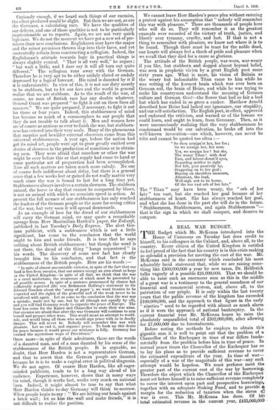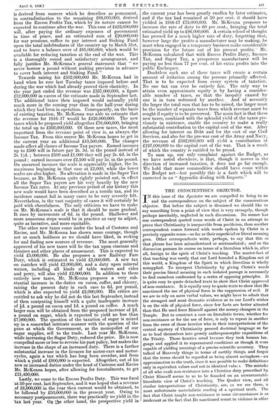A REAL WAR BUDGET. T HE Budget which Mr. McKenna introduced
into the House of Commons on Tuesday last does credit to himself, to his colleagues in the Cabinet, and, above all, to the country. Every citizen of the United Kingdom is entitled to feel proud of the fact that his country is in this crisis making so splendid a provision for meeting the cost of the war. Mr. McKenna said in the summary which concluded his most admirably lucid statement that, while we are raising some- thing like £300,000,000 a year by new. taxes, Dr. Helfferich talks vaguely of a possible £24,000,000. That we should be able to raise such an enormous sum as this in the middle of a great war is a testimony to the general soundness of our financial . and commercial system, and, above all, to tho patriotism of our people. It is only within the last twenty years that the public revenue of the kingdom has exceeded E100,000,000, and the approach to that figure in the early " nineties " used to be regarded with almost as much alarm as if it were the approach of national bankruptcy. In the current financial year Mr. McKenna hopes to raise the absolutely unparalleled total of £502,000,000, after allowing for £7,000,000 due to forestalments.
Before noting the methods he employs to obtain this gigantic sum it is well to point out that the problem of a Chancellor of the Exchequer in time of war differs funda- mentally from the problem before him in time of peace. In normal peace times the Chancellor of the Exchequer has so to lay his plans as to provide sufficient revenue to cover the estimated expenditure of the year. In time of war— especially of a war of the magnitude of this war—any such attempt would be hopeless. We must perforce meet the greater part of the current cost of the war by borrowing. Therefore the object which the Chancellor of the Exchequel Xallst set before himself is to raise sufficient revenue completely to cover the interest upon past and prospective borrowings, together with an adequate Sinking Fund, and to provide margin for the reduction of taxation when the stress al war is over. This Mr. McKenna has done. Of hio total estimated revenue in the current year, £423,000,000 is derived from sources which he describes as iermanent, in contradistinction to the remaining E86,000,111, derived from the Excess Profits Tax, which by its nature cannot be expected to continue after the war. This sum of £423,000,000 will, after paying the ordinary expenses of government in time of peace, and an estimated sum of £20,000,000 for war pensions, suffice to pay interest and Sinking Fund upon the total indebtedness of the country up to March 31st, and to leave a balance over of £85,000,000, which would be available for reducing taxation at the end of the war. This is a thoroughly sound and satisfactory arrangement, and fully justifies Mr. McKenna's general statement that "we never borrow a pound without making provision in advance to cover both interest and Sinking Fund." Towards raising his £502,000,000 Mr. McKenna had in hand when he rose last Tuesday taxes imposed before and during the war which had already proved their elasticity. In the year just ended the revenue was £337,000,000, a figure £32,000,000 in excess of the estimate made in September last. The additional taxes then imposed would naturally yield much more in the coming year than in the half-year during which they had been in operation. Consequently, on the basis of existing taxation, Mr. McKenna was able to estimate that the revenue for 1916-17 would be £426,000,000. The new taxes which he proposed yield altogether £76,000,000, bringing the total up to £502,000,000. Of these new taxes, the most important from the revenue point of view is, as always, the Income Tax. From this source Mr. McKenna hopes to get in the current year an additional £43,500,000. The changes made affect all classes of Income Tax payers. Earned incomes up to £500 will in future pay 2s. 3d. in the pound instead of 2s. 1;c1. ; between 1500 and £1,000 they will pay 2s. 6d. in the pound ; earned incomes over 12,500 will pay 5s. in the pound. On unearned incomes the scale is appreciably higher, the 5s. maximum beginning in that case at £2,000, while the lower scales are also higher. No alteration is made in the Super Tax because, as Mr. McKenna quite rightly pointed out, in effect all the Super Tax payers are hit very heavily by the new income Tax rates. At any previous period of our history this new scale would have been described as a terrific tax, and its incidence cannot fail in many cases to be very severely felt. Nevertheless, in the vast majority of cases it will certainly be paid with cheerfulness. The only criticism we have to make on Mr. McKenna's scale is that it should be more gradual. It rises by increments of 6d. in the pound. Shallower and more numerous steps would be in practice as easy to adjust, quite as lucrative, and more equitable. The other new taxes come under the head of Customs and Excise, and Mr. McKenna has shown some courage, though not as much boldness as we should have liked, in seeking for and finding new sources of revenue. The most generally approved of his new taxes will be the tax upon cinemas and theatres and other places of amusement. This is expected to yield £5,000,000. He also proposes a new Railway Fare Duty, which is estimated to yield £3,000,000. A new tax on matches will yield £2,000,000, and a duty upon mineral waters, including all kinds of table waters and cider and perry, will also yield £2,000,000. In addition to these entirely new taxes, Mr. McKenna proposes a very sub- stantial increase in the duties on cocoa, coffee, and chicory, raising the present duty in each case to 6d. per pound, which is also expected to yield £2,000,000. His critics are entitled to ask why he did not do this last September, instead of then contpnting himself with a quite inadequate increase of id. a pound on cocoa and ld. a pound on coffee. A much larger sum will be obtained from the proposed increase of id. a pound on sugar, which is expected to yield no less than 17,000,000. The question of the taxation of sugar is mixed up in a somewhat intricate manner with the question of the price at which the Government, as the monopolist of our sugar supplies, sell to the trade. Last year Mr. McKenna, while increasing the Sugar Duty, reduced the price. He is now 'compelled more or less to reverse his past policy, but makes the 'increase in the shape of an increased duty. There is a further • substantial increase in the licences for motor-cars and motor- cycles, again a tax which has long been overdue, and from which a yield of £800,000 is expected. Altogether, out of his new or increased duties under the head of Customs and Excise Mr. McKenna hopes, after allowing for forestalments, to get 121,450,000.
Lastly, we come to the Excess Profits Duty. This was fixed 'at 50 per cent. last September, and it was hoped that a revenue of £6,000,000 in the year then current would be obtained, to be followed by £50,000,000 in the present year. Owing to necessary postponements, there was practically no yield in the "tax lad year. On e other hand, the prospective yield in' the current year has been greatly swollen by later estimates, and if the tax' had remained at 50 per cent. it should have yielded in 1916-17 £75,000,000. Mr. McKenna proposes to increase the rate of duty to 60 per cent., bringing the total estimated yield up to £86,000,000. A certain school of thought has pressed for a much higher rate of duty, forgetting that, however large the profits a manufacturer may be making, he must when engaged in a temporary business make considerable provision for the future out of his present profits. '- Mr. McKenna calculated that with Excess Profits Duty, Income Tax, and Super Tax, a prosperous manufacturer will be paying no less than 77 per cent. of his extra profits into the public Exchequer.
Doubtless each one of these taxes will create a certain amount of irritation among the persons primarily affected. That is to be expected from every system of taxation. No one tax can ever be entirely fair. The only way to attain even approximate equity is by having a consider- able number of taxes, so that the inequity caused by one is in turn redressed by another. And of necessity the larger the total sum that has to be raised, the larger must be the number of separate taxes from which revenue Must be sought if equity is to be preserved.' The main fact is that these new taxes, combined with the splendid yield of the taxes pre- viously in existence, enable the country to make a really substantial contribution to the capital cost of the war. After allowing for interest on Debt and for the cost of our Civil Services, and also for the pre-war cost of the Army, ,and Navy, the revenue of £502,000,000 will yield a contribution of £197,000,000 to the capital cost of the war. That is a result of which the country is entitled to be proud. To sum up, our only complaint against the Budget, as we have noted elsewhere, is that, though it moves in the direction of increased taxation, it does not go far enough. We hold that more commodities should have come within the Budget net—but possibly this is a fault which will be corrected in an "Appendix dealing with Imports."



































 Previous page
Previous page